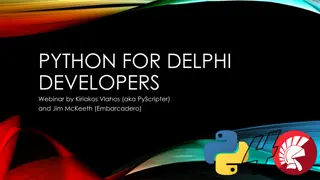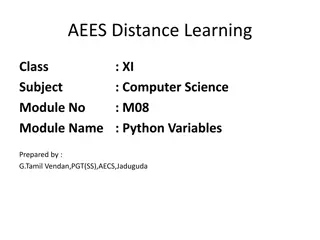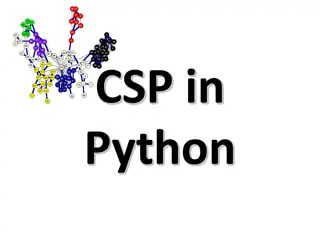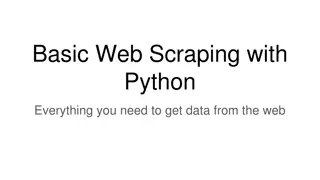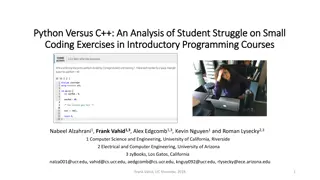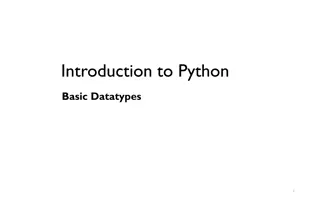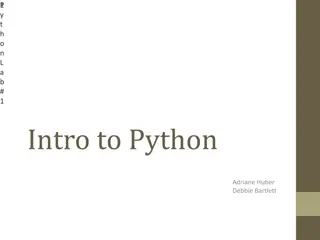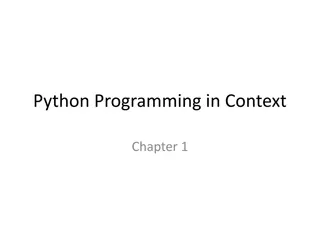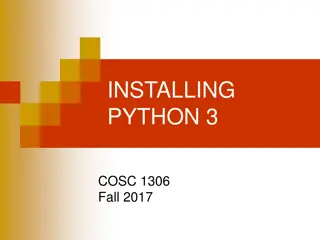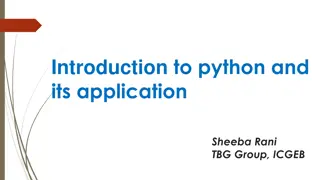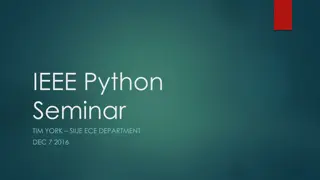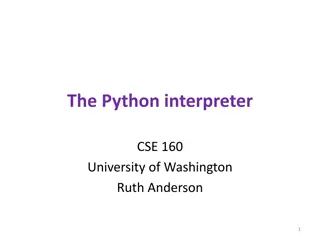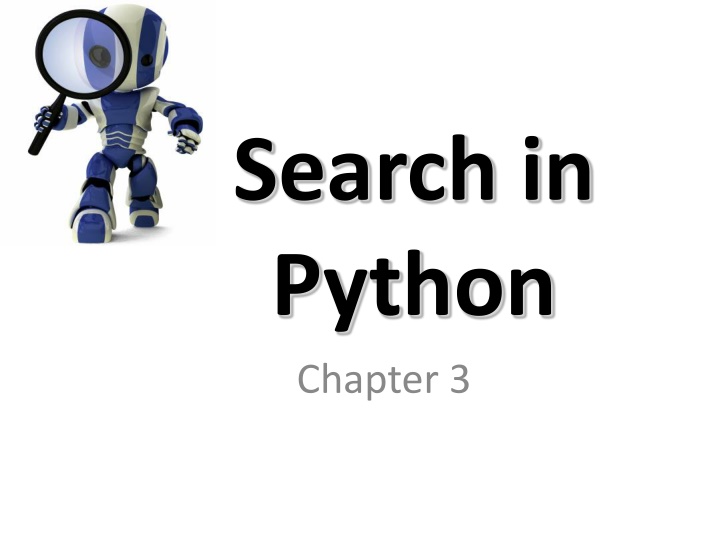
Python Search and Jug Problems
Explore Python search functionalities and solve water jug problems using the AIMA Python library. Learn how to install AIMA Python and define search problems with examples and code snippets. Dive into the Two Water Jugs Problem and understand the Problem class for search problems in Python Chapter 3.
Download Presentation

Please find below an Image/Link to download the presentation.
The content on the website is provided AS IS for your information and personal use only. It may not be sold, licensed, or shared on other websites without obtaining consent from the author. If you encounter any issues during the download, it is possible that the publisher has removed the file from their server.
You are allowed to download the files provided on this website for personal or commercial use, subject to the condition that they are used lawfully. All files are the property of their respective owners.
The content on the website is provided AS IS for your information and personal use only. It may not be sold, licensed, or shared on other websites without obtaining consent from the author.
E N D
Presentation Transcript
Search in Python Chapter 3
Todays topics AIMA Python code What it does How to use it Worked example: water jug program
Install AIMA Python ? Aimacode is a great github repo of python code linked to the AIMA book It s not available for pip installing Peter Norvig s recommendation One workaround is to: Clone repo on your computer and follow instructions in its readme file Add directory to your PYTHONPATH environment variable Use it with Binder
Two Water Jugs Problem 5 2 Given two water jugs, J1 and J2, with capacities C1 and C2 and initial amounts W1 and W2, find actions to end up with amounts W1 and W2 in the jugs Example problem: We have a 5 gallon and 2 gallon jug Initially both are full We want to end up with exactly one gallon in J2 and don t care how much is in J1
search.py Defines a Problem class for a search problem Has functions to do various kinds of search given an instance of a Problem, e.g., BFS, DFS, & more InstrumentedProblem subclasses Problem and is used with compare_searchers for evaluation To use for WJP: 1.Decide how to represent it (i.e., state, actions, goal); 2.Define WJP as a subclass of Problem; and 3.Provide methods to (a) create a WJP instance, (b) compute state successors, and (c) test for a goal
Example: Water Jug Problem 5 2 Action table Given full 5-gal. jug and empty 2-gal. jug, fill 2-gal jug with one gallon State = (x,y), where x is water in jug 1; y is water in jug 2 Initial State = (5,0) Goal State = (-1,1), where -1 means any amount Name Cond. Transition Effect dump1 x>0 (x,y) (0,y) Empty Jug 1 dump2 y>0 Empty Jug 2 (x,y) (x,0) x>0 & y<C2 y>0 & X<C1 (x,y) (x-D,y+D) D = min(x,C2-y) Pour from Jug 1 to Jug 2 pour_1_2 (x,y) (x+D,y-D) D = min(y,C1-x) Pour from Jug 2 to Jug 1 pour_2_1
Our WJ problem class 5 2 class WJ(Problem): def __init__(self, capacities=(5,2), initial=(5,0), goal=(0,1)): self.capacities = capacities self.initial = initial self.goal = goal def goal_test(self, state): # returns True iff state is a goal state g = self.goal return (state[0] == g[0] or g[0] == -1 ) and (state[1] == g[1] or g[1] == -1) def __repr__(self): # returns string representing the object return f"WJ({self.capacities},{self.initial},{self.goal}" Note: f-string
Returns list of possible actions in state Note: we represent an action as a tuple of its name and arguments, e.g. (dump, 1) (pour 2, 1) def actions(self, state): (J1, J2) = state (C1, C2) = self.capacities acts = [] if J1>0: acts.append(('dump', 1)) if J2>0: acts.append(('dump', 2)) if J2<C2 and J1>0: acts.append(('pour', 1, 2)) if J1<C1 and J2>0: acts.append(('pour', 2, 1)) return acts
Result returns successor state def result(self, state, action): """ Given state and action, returns successor after doing action""" if len(action) == 2: act, arg1 = action else: act, arg1, arg2 = action (J1, J2), (C1, C2) = state, self.capacities if act == 'dump': return (0, J2) if arg1 == 1 else (J1, 0) elif act == 'pour': if arg1 == 1: delta = min(J1, C2-J2) return (J1-delta, J2+delta) else: delta = min(J2, C1-J1) return (J1+delta, J2-delta) Note: the AIMA code will call this for each possible action that can be done in a state
Our WJ problem class def h(self, node): # heuristic function that estimates distance # to a goal node return 0 if self.goal_test(node.state) else 1 Note: this is only useful for informed search algorithms
Solving a WJP code> python >>> from wj import * # Import wj.py and search.py >>> from search import * >>> p1 = WJ((5,2), (5,2), ('*', 1)) # Create a problem instance >>> p1 WJ((5, 2),(5, 2),('*', 1)) >>> answer = breadth_first_search(p1) # Used the breadth 1st search function >>> answer # Will be None if the search failed or a <Node (0, 1)> # a goal node in the search graph if successful >>> answer.path_cost # The cost to get to every node in the search graph 6 # is maintained by the search procedure >>> path = answer.path() # A node s path is the best way to get to it from >>> path # the start node, i.e., a solution [<Node (5, 2)>, <Node (5, 0)>, <Node (3, 2)>, <Node (3, 0)>, <Node (1, 2)>, <Node (1, 0)>, <Node (0, 1)>]
Comparing Search Algorithms Results Uninformed searches: breadth_first_tree_search, breadth_first_search, depth_first_graph_ search, iterative_deepening_search, depth_limited_ search All but depth_limited_search are sound (i.e., solutions found are correct) Not all are complete (i.e., can find all solutions) Not all are optimal (find best possible solution) Not all are efficient AIMA code has a comparison function
Comparing Search Algorithms Results HW2> python Python 2.7.6 |Anaconda 1.8.0 (x86_64)| ... >>> from wj import * >>> searchers=[breadth_first_search, depth_first_graph_search, iterative_deepening_search] >>> compare_searchers([WJ((5,2), (5,0), (0,1))], ['SEARCH ALGORITHM', 'successors/goal tests/states generated/solution'], searchers) SEARCH ALGORITHM successors/goal tests/states generated/solution breadth_first_search < 8/ 9/ 16/(0, > depth_first_graph_search < 5/ 6/ 12/(0, > iterative_deepening_search < 35/ 61/ 57/(0, > >>>
The Output hhw2> python wjtest.py -s 5 0 -g 0 1 Solving WJ((5, 2),(5, 0),(0, 1) breadth_first_tree_search cost 5: (5, 0) (3, 2) (3, 0) (1, 2) (1, 0) (0, 1) breadth_first_search cost 5: (5, 0) (3, 2) (3, 0) (1, 2) (1, 0) (0, 1) depth_first_graph_search cost 5: (5, 0) (3, 2) (3, 0) (1, 2) (1, 0) (0, 1) iterative_deepening_search cost 5: (5, 0) (3, 2) (3, 0) (1, 2) (1, 0) (0, 1) astar_search cost 5: (5, 0) (3, 2) (3, 0) (1, 2) (1, 0) (0, 1) SUMMARY: successors/goal tests/states generated/solution breadth_first_tree_search < 25/ 26/ 37/(0, > breadth_first_search < 8/ 9/ 16/(0, > depth_first_graph_search < 5/ 6/ 12/(0, > iterative_deepening_search < 35/ 61/ 57/(0, > astar_search < 8/ 10/ 16/(0, >




